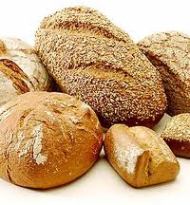Food for thought or food for performance?
Gluten-Free Pre-Race Meal May Optimize Performance
Have that sluggish bloated feeling on race day when you have been carbo-loading? It might be gluten the culprit.
But what exactly is gluten? Gluten is a protein compound made up of two proteins called gliadin and glutenin that are found joined with starch in the grains wheat, rye and barley. Exposure to gliadin – the “toxic” component of gluten for people with celiac disease—causes the body to go into immunologic overdrive. One of the consequences is decreased nutrient absorption. When the gut is unable to absorb nutrients, anemia, weight loss, abdominal pain, bloating, diarrhea and vitamin deficiencies may occur. The only definitive treatment for celiac disease is strict avoidance of gluten-containing foods.
Athletes can experience all kinds of symptoms from gluten intolerance. Some may suffer from constipation, diarrhea or other irritable bowel-like symptoms and may believe this is just “how they are”.
Personally gluten intolerance was one of the causes behind my anemia and low energy levels. Poor absorption of nutrients left me with low iron levels thus directly impacting on performance.
Also today sports nutritionists in the ultra world tend to agree that we consume far too much carb in the form of refined and processed pasta, bread, biscuits and cereals. We should on the contrary be training our bodies to run on more fat in long-distance and ultra events.
Some experts suggest that gluten intolerance can affect 1 out of every 10 individuals. For athletes, both professional and amateur, with undiagnosed celiac disease/gluten intolerance the benefits of a gluten-free diet on performance can be many.
A recent article in Men’s Journal from February 2010, noted that Garmin-Transitions pro cycling team went gluten-free during their race season. The riders found that their performance, digestion and recovery improved on a gluten-free diet.
A gluten-free diet can
- reduce inflammation
- increase energy
- and clear up mystery aches and pains.
The drawback is being on a totally gluten-free diet is a complicated matter but don’t despair
- All UK supermarkets have a selection of gluten-free products
- A lot of restaurants now offer gluten-free options – even some airlines I travel on
- You can prepare your own gluten-free recipes
For a list of gluten containing foods here


